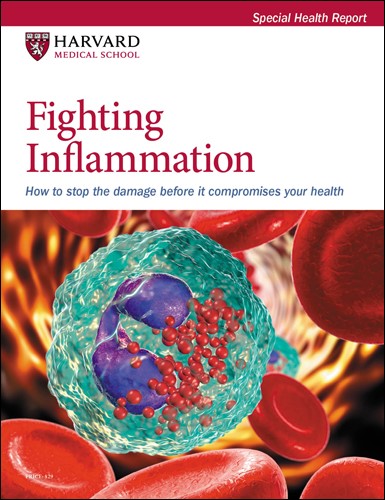Playing with the fire of inflammation
Inflammation plays a central role in healing, but left to run wild, this process can lead to arthritis, heart disease, and Alzheimer's.

Image: Ingram Publishing/Thinkstock
Inflammation is like a fire in your body you cannot see or feel. "It's a smoldering process that injures your tissues, joints, and blood vessels, and you often do not notice it until significant damage is done," says Dr. Andrew Luster, of the Center for Immunology and Inflammatory Diseases at Harvard-affiliated Massachusetts General Hospital. The damage might show up as arthritis, heart disease, stroke, and even Alzheimer's disease.
However, inflammation is not evil per se. It has an important role in how your immune system keeps your body safe and healthy. "The goal is to keep inflammation in check and not let the fire run wild," says Dr. Luster.
Good versus evil
There are two types of inflammation: acute and chronic. Most people are familiar with acute inflammation. This is the redness, heat, and swelling around tissues and joints that happens when you cut your finger or bang your knee.
When the body signals an injury, your immune system sends out an army of white blood cells to surround and protect the area. The process works the same way if you have an infection like the flu or pneumonia.
"Acute inflammation is how your body fights invaders that may cause infection, as well as being a part of the healing process," says Dr. Luster. "In this way, inflammation is a good thing, because it protects the body."
Chronic inflammation, however, is different. The same reaction as in acute inflammation takes place, except now the flame persists. White blood cells flood the problem area and end up attacking nearby healthy tissues and organs.
Check your inflammation levels
Do you suffer from chronic inflammation? A simple blood test from your doctor may tell you. It measures a liver chemical, C-reactive protein (CRP), which rises in response to inflammation. The result can help your doctor devise a strategy to lower your levels. Image: vchal/Thinkstock |
For example, if you are overweight and have more visceral fat cells—the kind of fat that builds up in your abdomen and surrounds your organs—the immune system sees those fat cells as a threat and pumps out more white blood cells. The longer you stay overweight, the longer your body remains in a state of inflammation. The fire just keeps burning.
"This reaction is not confined to one particular place either," says Dr. Luster. "Inflammation can travel throughout the body and cause problems all over. If you get arthritis or heart disease, odds are chronic inflammation is a contributor," he says.
Protect yourself
Managing your diet and lifestyle are the two best ways to keep chronic inflammation under control, says Dr. Luster. As mentioned, excess weight is a frequent cause of inflammation, and losing extra pounds, especially around the belly, can lower levels. Other preventive steps, according to Dr. Luster, include these:
- Fighting gum disease. If your gums bleed when you brush or floss, you most likely have inflammation. Make an appointment to see your dentist for a check-up, and step up your oral hygiene.
- Treating high cholesterol. Get your levels tested, and speak with your doctor about taking statins to keep lipids under control if they are deemed too high.
- Quitting smoking. This is good, all-around health advice. More specifically, the toxins from smoking have a direct link to inflammation.
Alter your diet
In terms of diet, you want to subtract and add. Cut back or eliminate simple sugars (like soda and candy), beverages that contain high-fructose corn syrup (like juice drinks and sports drinks) and refined carbohydrates (like white bread and pasta). "Not only are these types of foods empty calories, but overindulging in them can contribute to easy weight gain and thus trigger inflammation," says Dr. Luster.
You want to add foods rich in the antioxidants known as polyphenols. Studies have shown that these antioxidants have many anti-inflammatory properties.
Which foods are considered the best? A study in the May 2016 British Journal of Nutrition found that polyphenols from onions, turmeric, red grapes, and green tea lowered a marker for inflammation in the body. All types of berries also are rich in polyphenols, as are cherries and plums, as well as dark green leafy vegetables such as spinach, kale, and collards.
Olive oil, flaxseed oil, and fatty fish such as salmon, sardines, and mackerel offer healthy doses of omega-3 fatty acids, which have long been shown to reduce inflammation. Omega-3s may even lower levels in the brain. (See "Your brain on omega-3 fatty acids.")
"The goal is not to consume a certain amount per day, but to incorporate as many of these foods as possible into your regular meals," says Dr. Luster.
Disclaimer:
As a service to our readers, Harvard Health Publishing provides access to our library of archived content. Please note the date of last review or update on all articles.
No content on this site, regardless of date, should ever be used as a substitute for direct medical advice from your doctor or other qualified clinician.

















